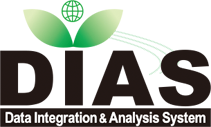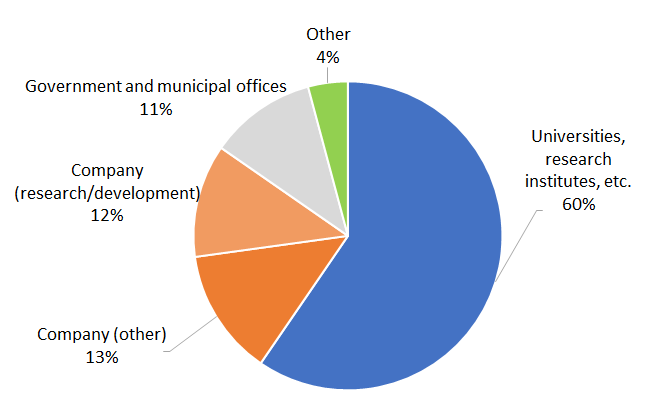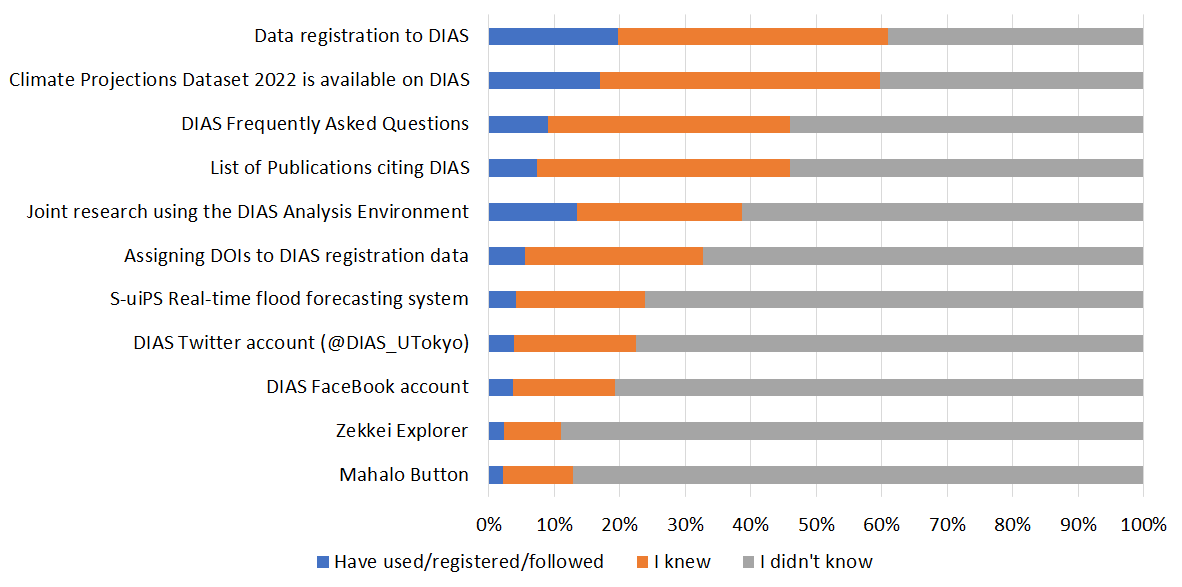2023.6.12
Report on DIAS User Survey 2023
We conducted a web survey of DIAS account holders in January and February 2022. Thank you very much for your cooperation.
We conducted this survey in Japanese and English, getting 769 replies, approximately 70% in Japanese and 30% in English. This ratio shows a similar trend to the survey in 2022.
Affiliations of DIAS account holders
About 60% were research institutions (universities, R&D agencies, etc.), about 1/4 were private companies, and about 10% were public offices and local governments. The “other” category includes NPOs, individuals, etc. The trend was similar to the results of the 2022 survey.
Awareness of DIAS services, applications
The most well-known in DIAS applications and services was “Data registration to DIAS,” about half of the respondents were also aware of “Release of the Climate Prediction Dataset 2022 from DIAS. The “DIAS FAQ page” and the “Results List and Results Registration Form” were also recognized by more than 40% of respondents.
DIAS offers a variety of services and applications. We hope this survey has provided some insight into the activities of DIAS.
The following is a list of the activities of DIAS that we asked about awareness of in this survey.
- Joint research using the “DIAS Analysis Environment”
New joint research proposals (free of charge) using the “DIAS Analysis Environment” are now being accepted (must be reviewed to be accepted). - Climate Projections Dataset 2022 is available on DIAS (Japanese page)
“Climate Projection Dataset 2022”, created by various scientific research programs in Japan, is now available on DIAS. - Zekkei Explorer (Japanese page)
An application aimed at releasing information on the forecasted occurrence of mirages and other natural phenomena. Currently open to the public on a trial basis. - S-uiPS Real-time flood forecasting system (Japanese page)
An application to predict urban flooding caused by heavy rainfall in real time. Currently open to the prior registered users. - Data registration to DIAS (Japanese page)
Consultation on research and public data related to the global environment field is available. - Assigning DOIs to DIAS registered data (Japanese page)
DOI can be assigned to public data in DIAS. - Mahalo Button
Research data usage sharing service. - List of Publications citing DIAS
list of research results (papers, presentations, etc.) obtained using DIAS. - DIAS Twitter account (@DIAS_UTokyo)
- DIAS FaceBook page (@dias.utokyo)
- DIAS FAQ page
We prepared the FAQ page based on last year’s survey responses etc.
Regarding the comments and questions in free form
We asked a question regarding the DIAS analysis environment and one about the other general issues in free form. We received 136 requests for the DIAS analysis environment and 106 other comments. We responded individually by e-mail to the 32 respondents who requested the contact by the DIAS. We are discussing how to respond to each of the comments we received on DIAS’s service improvement. In addition, we will continue to enhance our FAQ page to help resolve some of the questions we receive.
Frequently Asked Questions (FAQ)
We will continue to conduct surveys regularly and consider improvements to the system and other areas that reflect your wishes and opinions. Thank you for your continued support of DIAS.





